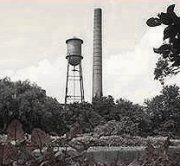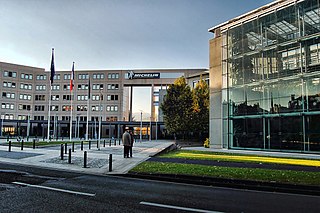
Michelin is a French multinational tyre manufacturing company based in Clermont-Ferrand in the Auvergne-Rhône-Alpes région of France. It is the second largest tyre manufacturer in the world behind Bridgestone and larger than both Goodyear and Continental. In addition to the Michelin brand, it also owns the Kléber tyres company, Uniroyal-Goodrich Tire Company, SASCAR, Bookatable and Camso brands. Michelin is also notable for its Red and Green travel guides, its roadmaps, the Michelin stars that the Red Guide awards to restaurants for their cooking, and for its company mascot Bibendum, colloquially known as the Michelin Man.

Bonner-West Riverside is a census-designated place (CDP) in Missoula County, Montana, United States, including the unincorporated communities of Bonner, Milltown, West Riverside, and Pinegrove. It is part of the Missoula, Montana Metropolitan Statistical Area. The population was 1,663 at the 2010 census, a decline from its population of 1,693 in 2000.

Milltown is a borough in Middlesex County, New Jersey, United States. The borough is nestled within the heart of the Raritan Valley region, with Lawrence Brook flowing through the center of the community. As of the 2010 United States Census, the borough's population was 6,893, reflecting a decrease of 107 (-1.5%) from the 7,000 counted in the 2000 Census, which had in turn increased by 32 (+0.5%) from the 6,968 counted in the 1990 Census.
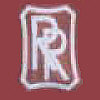
The Raritan River Rail Road was a 12-mile (19 km) shortline railroad in Middlesex County, New Jersey U.S., Founded in 1888, it was based in South Amboy, from which it ran west as far as New Brunswick. It served both passengers and freight in its heyday and operated profitably throughout much of its existence. The Raritan River was absorbed into Conrail in 1980, becoming a branch line of Conrail Shared Assets Operations. It terminates at U.S. Route 1 in North Brunswick.
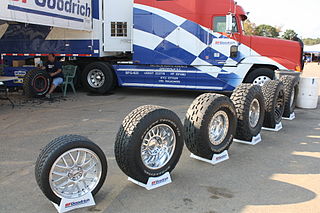
BFGoodrich is an American tire company. Originally part of the industrial conglomerate Goodrich Corporation, it was acquired in 1990 by the French tire maker Michelin. Prior to the sale, BFGoodrich was the first American tire manufacturer to make radial tires. It made tires for the then new Winton car from Winton Motor Carriage Company.
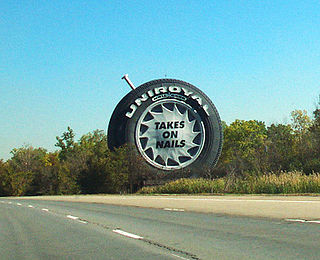
The United States Rubber Company (Uniroyal) is an American manufacturer of tires and other synthetic rubber-related products, as well as variety of items for military use, such as ammunition, explosives and operations and maintenance activities (O&MA) at the government-owned contractor-operated facilities. It was founded in Naugatuck, Connecticut, in 1892. It was one of the original 12 stocks in the Dow Jones Industrial Average, and became Uniroyal, Inc., as part of creating a unified brand for its products and subsidiaries in 1961.

Constable Hook is a cape located on the north side of the outlet of Kill van Kull into Upper New York Bay in Bayonne, New Jersey. The cape has long been an important site of marine transfer operations in the Port of New York and New Jersey. Just offshore, Robbins Reef Light serves to guide harbor traffic. Since the late 20th century, brownfields have been repurposed for recreational and commercial uses.
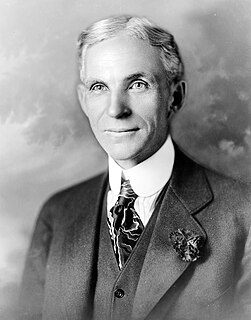
The Ford Motor Company is an American automaker, the world's fifth largest based on worldwide vehicle sales. Based in Dearborn, Michigan, a suburb of Detroit, it was founded by Henry Ford on June 16, 1903. Ford Motor Company would go on to become one of the largest and most profitable companies in the world, as well as being one of the few to survive the Great Depression. The largest family-controlled company in the world, the Ford Motor Company has been in continuous family control for over 110 years. Ford now encompasses two brands: Ford and Lincoln. Ford once owned 5 other luxury brands: Volvo, Land Rover, Jaguar, Aston Martin, and Mercury. Over time, those brands were sold to other companies and Mercury was discontinued.

The Indian Head River rises on the southern boundary of Hanover, Massachusetts and northern boundary line of Hanson, Massachusetts at the intersection of tributaries from Drinkwater River in Hanover and Indian Head Brook in Hanson. The river then flows east along the Hanover-Pembroke border. The river, 3.7 miles (6.0 km) long, is a tributary of the North River, which flows into Massachusetts Bay. The Indian Head River was an important fishing and water pathway for the Massachuset Indian village of Mattakeeset which was located around the Pembroke Ponds.
Dunlop Ltd. was a British multinational company involved in the manufacture of various natural rubber goods. Its business was founded in 1889 by Harvey du Cros and he involved John Boyd Dunlop who had re-invented and developed the first pneumatic tyre. It was one of the first multinationals, and under du Cros and, after him, under Eric Geddes, grew to be one of the largest British industrial companies. J B Dunlop had dropped any ties to it well before his name was used for any part of the business. The business and manufactory was founded in Upper Stephens Street in Dublin. A plaque marks the site, which is now part of the head office of the Irish multinational departments store brand, Dunnes Stores.
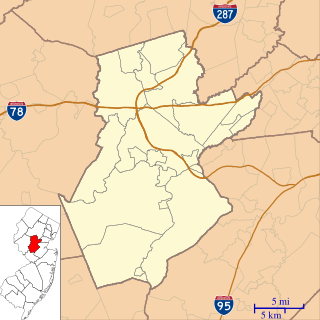
Weston is an unincorporated community and census-designated place (CDP) located in Franklin Township, in Somerset County, New Jersey, United States. As of the 2010 United States Census, the CDP's population was 1,235.
The West End is the former name of the only neighborhood in Historic Downtown Jersey City, New Jersey that is entirely west of the New Jersey Turnpike's Newark Bay Extension.

Joseph H. Allen was an industrial businessman, an officer in the Civil War, and a town supervisor of Brunswick, New York. Allen was born in Alburg, Vermont, to parents of British descent and left home at an early age. After several business ventures, he became successful in the auger and hoe business, selling mainly to the American South. He successfully ran for supervisor of the Town of Brunswick in 1856 and justice of the peace in 1861. At the beginning of the Civil War, his sales plummeted so he closed his business and enlisted in the Union Army. Allen was wounded multiple times during his service and ended his career at the rank of lieutenant colonel. He returned home to reopen his factory, which was instrumental to the industrial success of the hamlet of Eagle Mills in the mid to late 19th century. He died in 1884 at the age of 62.

The Ford Valve Plant is a factory building located at 235 East Main Street in Northville, Michigan. The plant was built as part of Henry Ford's vision of decentralizing manufacturing and integrating it into rural communities. It was listed on the National Register of Historic Places in 1995.

The Old Mill Museum, also known as the Alfred Wilkerson Grist Mill, is a historic structure located along the River Raisin at 242 Toledo Street in Dundee, Michigan. It was designated as a Michigan Historic Site on August 3, 1979. It was later listed as a contributing property within the Dundee Historic District, which was added to the National Register of Historic Places on August 20, 1990.
The Raritan River Freight Station is the only surviving station of the Raritan River Railroad and is located in Milltown, New Jersey. It is currently owned by James Curran and has agreed to sell the station to the Raritan River Railroad Historical Society for one dollar if they can find the means of moving it off of his property. For a number of years he has been using the station as a storage room. He has recently stopped this as a result of the stations deteriorating condition.

Henry Ford's Village Industries were small factories located in rural areas of Michigan. Ford developed his Village Industries in part to provide farm workers a stable source of income during the winter months.

The Nathan Cooper Gristmill is a historic gristmill on the Black River located at 66 NJ Route 24 in Chester Township, Morris County, New Jersey. It was added to the National Register of Historic Places on November 21, 1976 for its significance in industry.
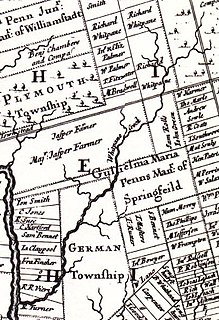
Spring Mill is a small unincorporated community in Whitemarsh Township, Montgomery County, Pennsylvania.
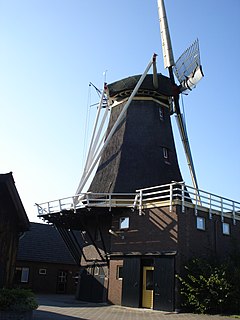
De Hoop is a gristmill in Oud-Zevenaar, the Netherlands. It was owned by the Pijnappel family from 1852 until 2014, at which point it was sold to the Botter family. The current miller is Frits Botter.

